Toys have been thrown out of proverbial prams due to so-called political voting, the media have roared about the contest being unfair, and each year we watch the exchange of top points between neighbours. It’s easy to say that Eurovision is not a fair song contest. However, the EBU has tried valiantly to rectify this in recent years. Juries were re-introduced in 2009 and have been a feature of the contest since then. Those juries now have extended powers: they are asked to vote on each song from 1st place to last place; they are asked to use certain criteria to judge the performances; and, new for this year, the jury members must be revealed to the public on May 1st and will have their names attached to the points they give after the contest. Jon Ola Sand, Executive Supervisor of the Eurovision Song Contest, recognises the importance of making the contest appear fair, and when revealing the new jury rules for 2014 added that it is ‘to make sure participants, viewers and fans know that we have done and will always do our upmost to secure a fair result.’
Ben Robertson from our Insight team decides to see how much of a fair song contest Eurovision actually is by asking those people behind the songs. A selection of the composers involved in the 2014 Eurovision process have been interviewed to tell their personal story and to answer the question ‘Is Eurovision a Song Contest?’
———————————————————–
“There are of course many downsides with Eurovision and songwriting. It’s a difficult job, and you have to work hard to get the results you want, and then you love it” my first meeting on this journey was a very frank discussion that I had with some friends of mine in Stockholm.
Ylva and Linda Persson are songwriters from Stockholm, who this year have travelled around Europe in their quest to reach the contest in Copenhagen. That journey has seen their music performed across Lithuania, Malta, Belarus and Ukraine, with a trip last year to Moldova as well. Although not getting through any of these contests, the top 5 placing in both Belarus and Ukraine should be highly commended for the girls who have as their best experience a win in the Home Composed Song Contest.
As semi-professionals, the girls have had a tough ride across Europe to try and find their dream. However they are still in love with the concept of the contest. “Our love for Eurovision has always been the song and performances and not the contest. Our goal was to compete and now we want to go further and be better, but you should not forget all the happiness this contest is all about.” I push them to say if they feel they have a fair chance when they explore the opportunities in other countries.
“From our experience, we seldom see a foreign composer winning in another countries. The artists who wanted to work with us, especially from the East, have found our songs exotic and fresh. In Sweden there are lots of really great producers and songwriters, so it is extra hard to enter as a new composer, but not impossible. It is though no longer a contest for the new talents, rather the experienced.”
The apparent explosion of Swedish songwriters sending songs across Europe seems to stem more from the limitations of songs in Melodifestivalen, rather than from a need to conquer Europe via Scandi-pop. We can count multiple songs in each Eurovision in the last 5 years with Swedish connections, and Sweden’s clique-like and predictable competition now separates out the professional composers from the rest. One place goes to the non-professionals, giving one lucky placing to a song picked from nearly 600 submitted. These ratios discourage songwriters like Ylva and Linda, and don’t give them the fair chance to gain support or not against the bigger names.
As for Eurovision itself, the girls are well seasoned now at dragging themselves across all four corners of the continent for the small chance of fame. Despite how tough it is, they do love it. I want to know what they want from Eurovision more in the future.
“It depends on who you are asking, and you can’t make everyone happy, but hopefully the future will bring new opportunities for Eurovision and maybe the music industry in general to be better and more fair.”
Eurovision is such a huge platform that is there to reward the art of songwriting and, more than anything, I get the feeling from both Ylva and Linda that they just want opportunity to get their music heard and have a chance, to have that opportunity through the style of music they love that emcompasses so much of this Eurovision competition. The girls had one song in Sweden, “Varje Steg”, which was in the mammoth 180 song selection of amateur songs all online in Melodifestivalen’s Webbjoker. It was a car crash of a process, but not necessarily a project that has to fail. Christer Björkman was present at Germany’s final this year, where he will have witnessed the new band Elaiza come through against seasoned pros Unheilig. Eurovision is always a place for the seasoned pros needing to be challenged by new talent, and the more battles like this we get the better for the sustainability, and the outward looking fairness, of the entire Eurovision Song Contest.
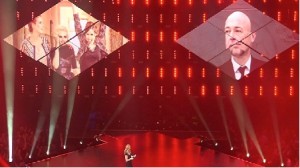
More Elaiza vs. Unheilig moments will encourage many unsigned composers to give Eurovision their best
No key changes please, we’re Irish
One person who has made the jump successfully from the Home Composed Competition to the big boys and girls Eurovision is Jonas Gladnikoff. The Swede now lives in the Åland Islands, a Swedish-speaking part of Finland, and is an active Eurovision fan. You may find him as a regular member of the ESCNation message board, and his love of Eurovision was one factor in spurring him on to study songwriting, and it now brings him back to the contest year after year. Like the girls above, he has sent songs across the continent, but Ireland has become his main stomping ground, writing three winning songs and one that ended just second behind Jedward in the last 6 years for the Irish National Final.
We started by asking about his history in the Contest, which reveals a story that sounds common with that of many Swedes. For Jonas, it started out with a friend of a friend knowing somebody in Albania needing a song, and Jonas came in with one he had which ended up in the Festivali i Këngës back in 2006. Even in this short window of time, he has seen the changes in the competition and the style of music.
“I think it (the style of music) has to do with the fact that Eurovision songs have to be under three minutes, and you need a certain structure to fit in certain stuff in that timescale. You can go extreme and shove in key changes and so on that typical Eurovision songs have, but these days they are not so needed. In fact, when I started writing music and I was thinking about Eurovision terms, key changes were more common. Nowadays I know that a lot of broadcasters are specifically requesting not to have songs with key changes, because they want songs to also be the hits on radio, there is a move to not want to put anything on that sounds too schlager. It creates more of a challenge as a songwriter, people expect that lift in the final chorus, and when you can’t do it you need different techniques to make it possible.”
Writing songs prescribed for the magic formula
Jonas is speaking as somebody who has been on the circuit a long enough time to curb his natural instincts. Key changes define some of his songs in years gone by, and it’s interesting to hear first hand that the commerciality of songs has honed in directly at one compositional technique and is sending it to the grave. I ask if Jonas is also aware, and is playing smart, towards the jury criteria of the contest [which the EBU have confirmed will be unaltered as last year].
“When I try and write songs, I try to think first just about getting to Eurovision, rather than winning the entire thing. It is too easy to make something that sounds too forced. It would be difficult to write taking in all those factors, but the juries definitely give extra points to those that sing really great. Of course I can find great singers and make it very vocally impressive; people are so used to those high notes and wailing from Idol and so on. But a good voice doesn’t need to do the high notes, or they can do it but they don’t need to in every song. I prefer songs with a great melody and not just those with a weak melody but lots of vocal technique stuff. I think it is a shame the juries are instructed to vote for good voices because it’s hard to judge who is a good singer in three minutes on stage as that depends on the song as well. It’s confusing.”
The timing of this interview is also key. Before the 2014 Contest, we are waiting to see if Ireland will make it through the semi final where it has to compete alongside songs that do have big vocals, and melodic movements that are forced to do so. Romania is of course the prime example of this, with Paula Seling hitting crazy-big notes provided by Ovi to show this off and tick this criteria. As Jonas rightly says, the best songs don’t need to show off this skill, but Eurovision rules imply that it does, taking it further away from a song contest and more of a singing contest.
I put this to the EBU itself, asking if it is possible to fairly judge this in just a three minute window. Sietse Bakker, our Event Supervisor for Eurovision 2014, gave this response that ‘we are not asking to judge the overall skills of the performer, but just vocal capacity as shown in that respective performance.’
This is taking it away from the song even further and more for what we do see in that three minute window. The EBU definition is actively looking for bombastic vocal movements to dazzle us, so those notes need to be in there to do so. It’s not asking us to pick the best singer, but is looking still for something special from that performance.
When I think back to a song like “Kedvesem”, I wonder how it is fair to rank this using this criteria when it is simply not trying to show any vocal capacity, capacity being a loaded word here because of the link which how much vocal you can do, rather than the quality and the effect you produce with that vocal. For an equivalent effect this year, take Poland’s entry “Slavic Girls”. While I met the Polish act in Riga for their Eurovision Preview Party, I got to ask the hit producer Donatan about how much they think about making their global sensation of a song fit Eurovision. It turns out they haven’t.
“We don’t want to fit this song into what Eurovision is, we just go with a popular song, a song that is really popular in Poland, and we don’t fit anything for Eurovision. We do something we know is good.”
That self-confidence is great, but of course we know that it puts them at a disadvantage for half of their score from each country. It is the equivalent of being back at school for a test, two kids have the same test, but one has simply shown up while the other has checked their homework in extra detail and knows not just what is on the test, but how you need to answer the question. The Polish song represents the first child, whereas Romania’s and Ireland’s entries are examples of the latter. Poland may still eventually beat them both, but the upper hand is always for those songwriters in the know, as vocal capacity is such a technical term beyond that of the skill of an effective song.
Beyond the nitpicking Jonas had on this point, is the pleasure that exudes from Jonas in having songs to be a part of the world’s biggest song contest. How much it is a true song contest though, is something Jonas is a little sceptical of anyhow.
“I think when answering that question we need to think if this ever was a song contest. When it started up, they just announced the winner and the idea was just to come together and have a fun TV show. It is a contest, but the contest part isn’t the most important, it’s a music festival and the highlight is, and should be, the songs themselves.”
Writing music that comes from the heart
I look to see further how much the composers feel that they a part of the show, and if they feel they get a fair deal from the contest element of this. Following his discussion, I get in touch with Rafael Artesero . This year marks his fourth appearance in Eurovision as a songwriter being behind the Belgian entry, after previously writing twice for Andorra and once for Spain. Eurovision has been dear to his heart from a small age, when he would run along the streets of Bilbao to listen through a window where Mocedades, singing “Eres Tu” and their other classics, would inspire him to pick up music himself. The story how the song “Mother” came to be sheds extra light on his personal look at the contest.
“I originally wrote the song for a female voice, and although I wrote it about my mother, it wasn’t directly through my mother that I got the inspiration. I saw a friend, really close to me, have a problem and she was broken-hearted, devastated, and she went to her mother. It made me ask myself about my mother’s relationship, so I started to write this and I tried to make it into this female context.”
Then of course, comes the link to Belgium. “I have family in Belgium and it was something special to send a song there. In Belgium then we had to adapt to the male singer and the broadcaster found the native English speaker to help.”
Whatever our opinions on the end product of this match-up, when Rafael spoke to me I could feel how proud he was of the work and the feelings that the song pours out. I wonder how he feels about the technical aspects of the song and how those are assessed by the juries.
“I think the jury should be like this, they should vote for the technical things. A good song, with a bad performance, makes it a terrible song. It happened to me in Andorra in 2006, one of the backing vocals was out, and it was painful in your ear. Sometimes, you just have to say ‘ok’.”
I probe for more, but Rafael toes the party line in terms of how the contest is run. He believes it is fair, that the jury works well and how all changes to Eurovision are good to make it a great show (controlling the running order, for example). Rafael is just delighted that he has songs in the contest and that ‘going to Eurovision is already a success.’ He appreciates the delicate balance that is needed; we don’t have and should not have 26 songs by the same singer with no dancing. He wants it to be a fun TV show to bring in the millions of viewers, but how does he feel it is as a actually song contest?
“It’s a lot less now. The songs are involved, but when you see these Grannies on the stage baking, yes it is a song, but the thing behind it is also important. It is a TV programme, and it’s good as it is now.”
The evolution of Eurovision across generations
It’s hard to find somebody else with even more experience than Rafael and Jonas involved in Eurovision this year, but one man obviously stands out in this regard. Ralph Siegel is behind the San Marinese entry once again this year, marking his 22nd entry into the Eurovision Song Contest. I ask Ralph how he has seen Eurovision change through the years, and if it has become less about the song now as it was previously. As you would expect, he has a lot to say.
“To answer this question I could write a little book! In the old days it used to be a songwriters contest, and only the writers were awarded with the prize. This has changed in the last few years and is absolutely a good decision.
Also, the orchestra was playing live and I remember playing piano in The Hague with white clown puppet gloves for Katja Ebstein, and singing at the same time. The tension was enormous because any wrong note would have been terrible. This really meant that you had to be be able to perform right at the moment and not have something you could redo in the studio a hundred times until it fits. This also meant writing songs which we were able to perform live.
I think that the long way before the final event, is much too long and exhausting in terms of promotion and internet feedback. It somehow starts in December and goes until May, almost half a year. In my mind all the pre-polls and voting hurts the whole event in many different ways. It makes some few artists happy and many others totally depressed.
I do not think that the idea of a song has changed, a great song is still a great song, but many other things have changed. Naturally some artists today try to make the song look better by coming up with enormous show elements like standing in and out a glass box or growing in three minutes up to 4 metres tall. Videos and show acting become more and more important, but finally in the radio the song has to be good and when you close your eyes people should love it too.”
As you may expect, Ralph speaks here like the grandfather of all things Eurovision. A quiet, mature and considered voice, harking back to the great time of old, and we would expect perhaps to be bitter about the changes to the contest. Ralph is open to ideas, and appreciates the modern staging of the contest and how that builds songs up to be more, all the composers I speak to understand, appreciate and tolerate this, there is a common thread between them. They know there are other factors involved in one of the world’s biggest TV events. Interestingly, all I spoke to were in favour of a system with both jury and televoters. They wanted the jury to focus on those aspects of their work, the songwriting behind their entries, and the televoters as a show of popular opinion.
Juries have changed lots in Ralph’s Eurovision decades, I ask further if he has opinions about how the juries work in the contest.
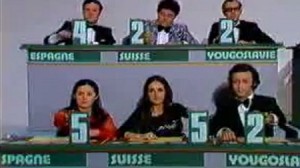
The year before Ralph’s first Eurovision entry, and the jury were seen on stage voting for their favourites
“The jury worked very professionally [in early Eurovision]. They had translations of the lyrics and listened to the song a few times each day before they voted. I guess they still give their best, but they had to vote in a different way, giving points to their favourites and the rest as well, because they were the [only] deciding group.
I guess some juries are perfect and some are not, but this is up to the TV stations who are in the game. Some take real musicians, some well-known artists and some take friends from the TV station. It’s not easy to find the right and perfect mix. I believe the old jury rules were better. It was divided by ten people or less under 25 and ten or less over 25 years old. It was partly professionals and also music interested ordinary people. Five people from the pop business to me are not enough, because the taste is probably to similar and the singers also voted differently than the writers.”
The methods of a modern day jury
The modern day jury of Eurovision does hark back to the early years that Ralph talks about. Since 2013, each jury member has been asked to rate each song from first place to last place in each of the shows, rather than just their top 10. The juries therefore have to give points to all of the different songs and judge them, based in theory on the four criteria from the EBU. Ralph is clearly in favour of this, and it does give the jury more responsibility to judge each and every song fairly.
I put to the EBU why exactly the juries have been brought back in, and got this response from Sietse Bakker.
“The reason, back in 2009, was two-fold. First of all we wanted to increase the professional credibility of the contest towards the public and the music industry. Secondly we wanted to increase suspense by decreasing the predictability of the voting.”
Professional credibility is an important factor, and certainly is one thing that we look for from a jury, if we are using them, we want to see that the jury is able to work for to help increase credibility.
The latter point, regarding suspense and decreasing predictability, is important when we consider how the contest has been moaned at so often for the voting patterns that emerge. However, the stories that plague the voting patterns still exist. The expansion of jury votes in 2013 has the effect that juries can now vote a song down as well as up. The effect is difficult to establish in just one year of data, but this effect would be one way of making results seem less predictable, as one person with a strong negative opinion can cost a song more places than it would in the previous voting system.
There is little issue in predictable voting in a pure competitive aspect when both jury and televotes back up the outcome from a professional aspect, but the viewing experience as a TV show and the nationalistic pride of supporters suffers. This is all a delicate balance. The danger is that voting from just a 5-person jury in this format could appear statistically as random, noisy data which would weaken the integrity of jury decisions when we all look to them for professional weighting in the results. Many calls like Ralph’s have been made to increase the numbers of jurors in each country, and one effect of this would be to decrease the amount of noise in the results process.
It also allows for divisive songs to struggle. More artistically original compositions that divided opinion between good and bad falter, coming high somewhere but prohibitively low by different jurors, whereas those that are inoffensive scored well from all sides. Is this effect something that we want of contest songs?
For this answer, I go back to my meeting with the lovely Conchita Wurst while in Riga, and the answer I got when I asked the simple straight-up question about how “Rise Like a Phoenix” came to be her Eurovision entry.
“I knew after the third note that this would be my song. I have to be honest, I was afraid because it was not mainstream, not the pop song people expected. I thought about it for a few days, ‘will it work, will it do good’. I think I have chosen the harder way, but the one I believe in. Of course I thought about that, and to be successful and to try and win the competition. Is a James Bond theme good for that or not? If I love the song so much then it must be the right song.”
Conchita is a divisive character, and how such a song will be perceived by the juries is something the Eurovision world wonders at the moment. But above all criteria and above all expectations, a love of the song and a love of the music keeps coming first from all involved as the actual artists and composers. It may be technical, but they are doing that for love and for feelings, not for point ticking. They are being true to themselves and who they are and what they want to present themselves as, and don’t want to be judged for or against based on that. As Ewan mentioned last week, how can you fairly rank a song like “Cake to Bake” against compositions that appear to be more “worthy”? I put this to Guntis Veilands, the writer of Latvia’s song, about their views on the criteria from their standpoint.
“The song is different than my normal piano and jazz. Jöran had the influence of these things, and we were jamming in this style. In some case, we wanted to include something that people could sing along, and especially with this song when we got the idea to do the song in both languages which you can sing along with.
My personal opinion is that Eurovision is more about the people coming together and doing their particular thing. It’s all different and that is great.”
Every song should be viewed on its own merit
Songs are different. Our artists and songwriters are creating things that are true to themselves. We need a system that will ensure that we judge “Cake to Bake” in the sphere of sing-a-long tunes as we compare “Rise Like a Phoenix” alongside Bond themes, “Undo” to other heartfelt ballads and so forth.
These people I have spoken to on the journey, these people behind each of the songs, don’t require huge amounts of recognition, but rather just crave a system that gives them each an equal chance to do what they artistically do. They want to have their art be a part of this wonderful show. They are a united team with the production and the artist, and it is a sad view of modern Eurovision that there is no requirement for the composers to be considered a part of each delegation, and some countries will not have the writers with the team in the Green Room.

A green room full of artists, backing singers, delegations and songwriting teams all celebrating the journey together (Photo: Eurovision.tv)
The gimmicks and the extravaganza are a distraction, but a tolerable one, and the composers recognise the need for the amazing show. Overall, there is just a wish that the juries that Eurovision has now work to focus on listening to each song on its own merit. To do this, the EBU’s criteria for a song are too strict and too defined. Even the rumoured but untrue criteria of ‘hit potential’ as a criteria wouldn’t achieve a fair balance for the contest. Did Rafael try and write “Mother” to be a pan-continental hit song? Were the team behind “Three Minutes to Earth” attempting to achieve Platinum status? Does “One Night’s Anger” represent something trying to go international and launch Hersi to a global star? All are definitely songs in their own right, and deserved to be judged purely on their artistry. It’s open to interpretation, but I would trust our juries to have the experience to do so based on the qualities of the respective songs in their respective genres, and I would prefer this to any calculated points-ticking.
A perfect song contest is out of reach, and Eurovision is far more than that, with far more show and far more cultural significance. However, these songwriters are putting time, effort and money in an attempt to reach their dreams, and the parts that can be controlled and assessed fairly deserve to be. What we can control with a jury vote needs to deliver that side of the coin, and how it works at the moment to achieve that seems to be confused.











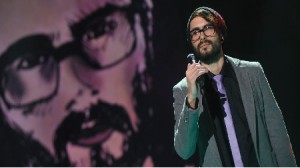
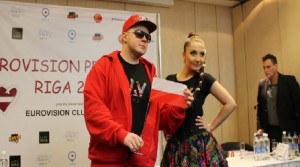
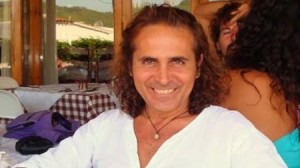
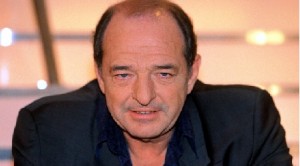
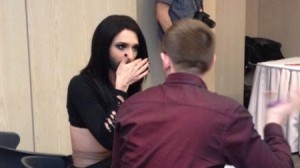
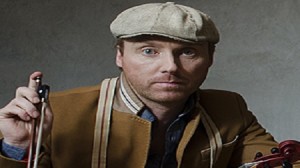
Good article and good idea to pursue this angle.
I have a lot of thoughts but after starting to write them all I decided it best not to open up too many other tangents. Or even continue those you’ve opened.
One thing though: I’m hoping the juries will stick firmly to their brief so that the consequences will be as clear as possible. I’d be most worried if they start using ad hoc tweaks to cover mis-steps (only) when they happen to be conspicuous.